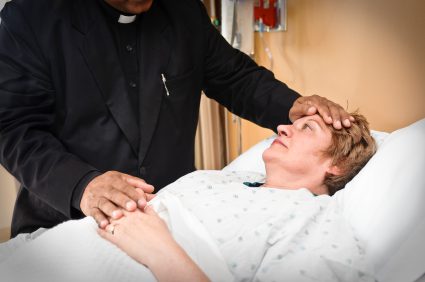Sacrament of Healing
For many today, there is still a fear or stigma about calling the priest for the anointing of the sick – or for older Catholics we remember, “Extreme Unction”. Since Vatican II, much has changed in the teaching and attitude in regard to this sacrament. It is not necessary or recommended by the Church that we wait until someone is dying to call a priest; in fact, if you are preparing for surgery or feel the need for healing – spiritually or psychologically – the Church teaches that this sacrament brings spiritual aid and comfort, including the forgiveness of sins to Christians who are seriously ill.
Individual and Communal
“Anointing of the Sick” can be performed on an individual basis according to the individual person’s needs, or it can be offered on a communal basis. Saint Brigid also offers a communal anointing of the sick on the third Sunday of every month after the 1:00 PM Mass in the Church.
There is a change in July. It will be offered on Sunday, July 27th. (4th Sunday – temporary change)
In a communal anointing, the priest calls for anyone who believes that they would benefit from the reception of the sacrament to come forward, and those who come forward then receive the sacrament.
In the event of a Sacramental emergency, please call the parish office. (after hours please follow the voice mail instructions, it will connect you to the answering service).
Requesting a Home or Hospital / Hospice Visit 
- Please, leave the name and phone # of the Sick OR name and phone # of the caller and their relationship to the Sick. (family member, friend, chaplain)
- Is the caller or the Sick a parishioner of Saint Brigid?
- Has the Sick person requested the visit? If not- does the Sick approve of this request?
- Location of the Sick (address, room number, any restricted hours?…)
- Purpose of the visit (Anointing, Communion, Confession, consultation?)
In the Church’s Sacrament of Anointing of the Sick, through the ministry of the priest, it is Jesus who touches the sick to heal them from sin – and sometimes even from physical ailment. His cures were signs of the arrival of the Kingdom of God. The core message of his healing tells us of his plan to conquer sin and death by his dying and rising.
The Rite of Anointing tells us there is no need to wait until a person is at the point of death to receive the Sacrament. A careful judgment about the serious nature of the illness is sufficient.
When the Sacrament of Anointing of the Sick is given, the hoped-for effect is that, if it be God’s will, the person be physically healed of illness. But even if there is no physical healing, the primary effect of the Sacrament is a spiritual healing by which the sick person receives the Holy Spirit’s gift of peace and courage to deal with the difficulties that accompany serious illness or the frailty of old age.
~from the United States Catholic Catechism for Adults
Sacrament of Anointing provides a special grace
- The uniting of the sick person to the passion of Christ, for his own good and that of the whole Church.
- The strengthening, peace, and courage to endure in a Christian manner the sufferings of illness or old age
- The forgiveness of sins, if the sick person was not able to obtain it through the sacrament of Penance
- The restoration of health, if it is conducive to the salvation of his soul
- The preparation for passing over to eternal life
Catechism of Catholic Church 1532
The special graces offered in the Sacrament of Anointing (oursundayvisitor.com)
Funerals
Catholic funeral preparation, information and what to do next.
Funeral Pre-Planning
Prepare for a loved one or your own funeral.
Bereavement Ministry
Recently lost a loved one? We are here for you.

